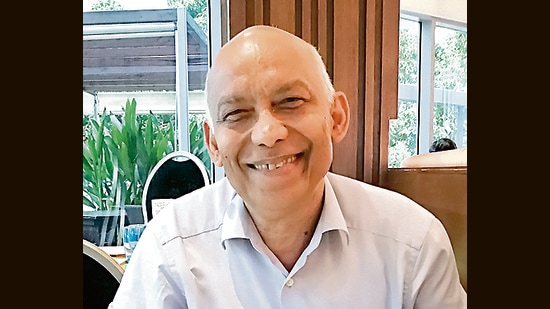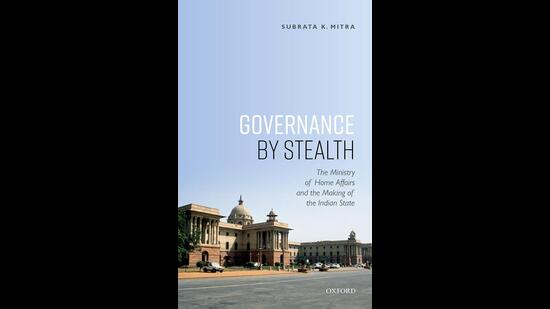Interview: Subrata K Mitra, author, Governance by Stealth: The Ministry of Home Affairs and the Making of the Indian State - “Patel and Nehru had a yang-and-yin relationship”
What got you interested in writing a book about the Union Ministry of Home Affairs? The idea struck me in 2002 while collecting data for another book – The Puzzle of India’s Governance: Culture, Context and Comparative Theory (2005)
What got you interested in writing a book about the Union Ministry of Home Affairs?

The idea struck me in 2002 while collecting data for another book – The Puzzle of India’s Governance: Culture, Context and Comparative Theory (2005). I was in Delhi, at North Block, interviewing a civil servant who was an impressive Oxford-educated man. During our conversation, I began thinking about how crucial the bureaucracy is in a country like India. While politicians are in the limelight, civil servants get things done behind the scenes.
The Union Ministry of Home Affairs is particularly interesting when one thinks of India’s transition from colonial rule to a post-colonial democracy. The Home Department set up by the British in India focused on gathering intelligence, quelling resistance, keeping Indian nationalism at bay, and turning rebels into stakeholders. The same department evolved into the Union Ministry of Home Affairs, and its new task was to facilitate the creation of a post-colonial state premised on feelings of national pride and patriotism. Ironic, isn’t it?

On the one hand, this transition shows institutional resilience. On the other hand, it shows that India’s political elites who succeeded British colonial rulers used similar tactics of “governance by stealth” – a concept I use to talk about the use of minimum force to generate maximum order. In fact, I have been interested in researching governance and public order for a very long time, since around 1976 when I was pursuing my PhD at the University of Rochester in the United States. When I came across political scientist Samuel Huntington’s claim that all postcolonial democracies will fail, I began to examine the Indian experience carefully and think about what makes it immune to failure despite its deep-seated challenges.
If you think about it, some regions in India are more orderly than others. I was curious to understand the reasons behind this phenomenon. So in the early 2000s, I started focusing on six states – Punjab, Bihar, West Bengal, Tamil Nadu, Gujarat, Maharashtra. It’s the same country, we have the same Constitution. Why is there so much regional variation? I explored this question in my 2005 book. The new one builds on it but the focus here is not so much on the federal structure but on the union ministry that bears the responsibility of law and order.
Were you worried about moving in sensitive terretory and putting yourself at risk or did your academic training as a political scientist equip you to brush off such concerns?
As a scholar, I am conscientious about following the law of the land. One must be sensitive to other people’s sensitivities because a researcher’s job is to analyse politics, not to get caught up in politics. I try to rise above partisanship, speak to both sides when there’s a conflict, and not poke my nose into things that are outside the scope of my research. That keeps me safe.
Your book gives the impression that the Union Ministry of Home Affairs protects our democracy against external threats but also curbs internal dissent in the name of national security. What constitutional safeguards keep the ministry in check?
I see the ministry as an intelligent institution that is capable of learning and self-correction. After each act of police firing, for instance, there is an enquiry commission. The reports are examined carefully, action is taken, and the ministry becomes more adept at anticipating why, where and how it might fail. Police officers who go rogue can be disciplined. Additionally, we have the judiciary and civil society organizations to keep a check on the ministry. There are opposition parties capitalizing on the failure of the ministry. We have a vigilant media observing and documenting. The ministry knows that journalists can make things difficult. All these stakeholders who keep the ministry in check form a safety network for citizens.
Tell us about the theoretical framework you employed while writing this book.
I have a long answer to this question, so stay with me. In my earlier book The Puzzle of India’s Governance: Culture, Context and Comparative Theory (2005), I had argued that political elites are able to ensure three things – “order” through the strategic conflation of regulation and self-regulation, “welfare” by attending to basic needs, and “identity” by discovering and honouring the sense of the sacred of ordinary people. Building on this framework, in my new book Governance by Stealth, I argue that power necessarily generates resistance. If those who are responsible for the exercise of power understand the causes of resistance and tackle it through diplomacy, negotiation, redressive action, and, failing all, a swift stroke of the hammer, then minimum force can generate maximum order.
I have drawn extensively on the work of Michel Foucault and Steven Lukes in my understanding of power, Rajni Kothari for his grip on Indian politics, William Riker for the concept of rational choice and games, Bingham Powell for comparative politics based on structural-functionalism, Bruce Bueno de Mesquita for the concept of political actors as strategists and Douglass North for the neo-institutional argument that institutions are not necessarily given; rather, they are made by human beings for enhancing human welfare.
Before going to Rochester, you pursued an MPhil at the Jawaharlal Nehru University (JNU). To what extent did your student years there shape your research interests?
When I was student there, we were mostly just PhD and MPhil students on campus. There were lots of opportunities to interact closely with our professors. We often ate together. Many of these professors were trained in foreign universities, and they created a culture of free enquiry inside and outside the classroom. For someone like me who grew up in Odisha, it was a whole new world. Since it was a left-leaning campus, I saw a lot of empathy towards people who are disadvantaged, oppressed, and excluded. I will always be grateful to JNU for teaching me empathy but I must also say that some of my fellow students mistook the campus for the world. Their sense of ideological purity was terribly out of sync with ground realities.
Who among all of India’s Home Ministers has been most exciting for you as a scholar?
Sardar Vallabhbhai Patel, without a doubt! He and Pandit Jawaharlal Nehru had a yang-and-yin relationship. They needed each other, and knew it. Analysing the correspondence between them for my new book was a real pleasure. Sometimes Nehru was a little impatient. Patel understood and tolerated it but didn’t forgive. Patel also knew how to bring out the best in the civil servants that he worked with. They were fearless, which is exactly what was needed in the early years of the post-colonial Indian state. I have read Patel’s correspondence, and his notes on files, and I have also read what others have written about him. For me, he remains the quintessential Home Minister. It was India’s great fortune to have him.
Only one woman – Indira Gandhi – has had the chance to serve as India’s Home Minister. In your opinion, why have women not been assigned this responsibility?
Well, let’s put it plainly, Indira Gandhi became the Home Minister because she appointed herself. She was able to do that because she was already the Prime Minister of the country. It was her way of capturing as much power as she could. She needed someone who would give her access to all the regional centres of power, and only the Home Minister is capable of doing that. Her appointment as the Home Minister had absolutely nothing to do with her identity as a woman. It was an incidental factor. Her being in that position had disastrous consequences for India, leading up to the National Emergency from 1975 to 1977.
The Home Minister needs to be someone who works closely with the Prime Minister but is not a puppet. This role needs a person who can think independently, state an opinion and defend it, without feeling a compulsion to kowtow before the Prime Minister. They must be on the same page but they need not start that way; they arrive there through discussion and deliberation. They are in those positions to serve the country and its people, not their egos.
I have no doubt that India will have more women serving as Home Ministers, especially after we have seen a powerful Finance Minister like Nirmala Sitharaman and a powerful External Affairs Minister like Sushma Swaraj. The women’s quota in the Panchayati Raj system has inducted between two to three million women into positions of power, and I am quite optimistic about the steady rise of India’s women up the ladders of political power.
While working on this book, you spent a lot of time rummaging through archives. What struck you about the role of archives in constructing, not just documenting, the state?
Let’s talk about why India has national archives in the first place. The rule is that everything done using public funds and involving public servants has to be written down somewhere. This process of documentation generates files, which cannot be opened for up to 30 years. While this might seem arbitrary, it is backed by sound reasoning. The conversations that take place between civil servants are meant to be protected by secrecy. Without this secrecy, they would not speak freely. They would speak only in order to please the powers-that-be. These files are declassified after a period of 30 years and sent to the national archives because they are valuable primary sources to understand what happened, who said what, and how conversations between civil servants fed into policymaking. These documents are interesting to read especially when some literary-minded officials write long paragraphs. But there are officials who only make notes such as “Yes”, “No”, “Okay”, “Seen”, “Do this”, and so on. The annual reports of the Home Ministry that are tabled before the Parliament are public but they give us an incomplete picture. The archives tell us what happened behind the scenes.
How do you feel about being on the long list for the Kamaladevi Chattopadhyay NIF Book Prize 2022?
It is an enormous honour for me, and a great source of satisfaction. The prize recognizes scholarly contributions to the study of modern India, and this mandate has been at the heart of my work ever since I was a young scholar working on my doctoral dissertation. I have been collaborating with political scientists, economists and historians who study modern India, and it is humbling to see this work being recognized. I live far away from India, so I often feel isolated, but knowing that this book has some resonance for readers in India has been a truly rewarding experience. I am very grateful.
Chintan Girish Modi is an independent writer, journalist and book reviewer.





